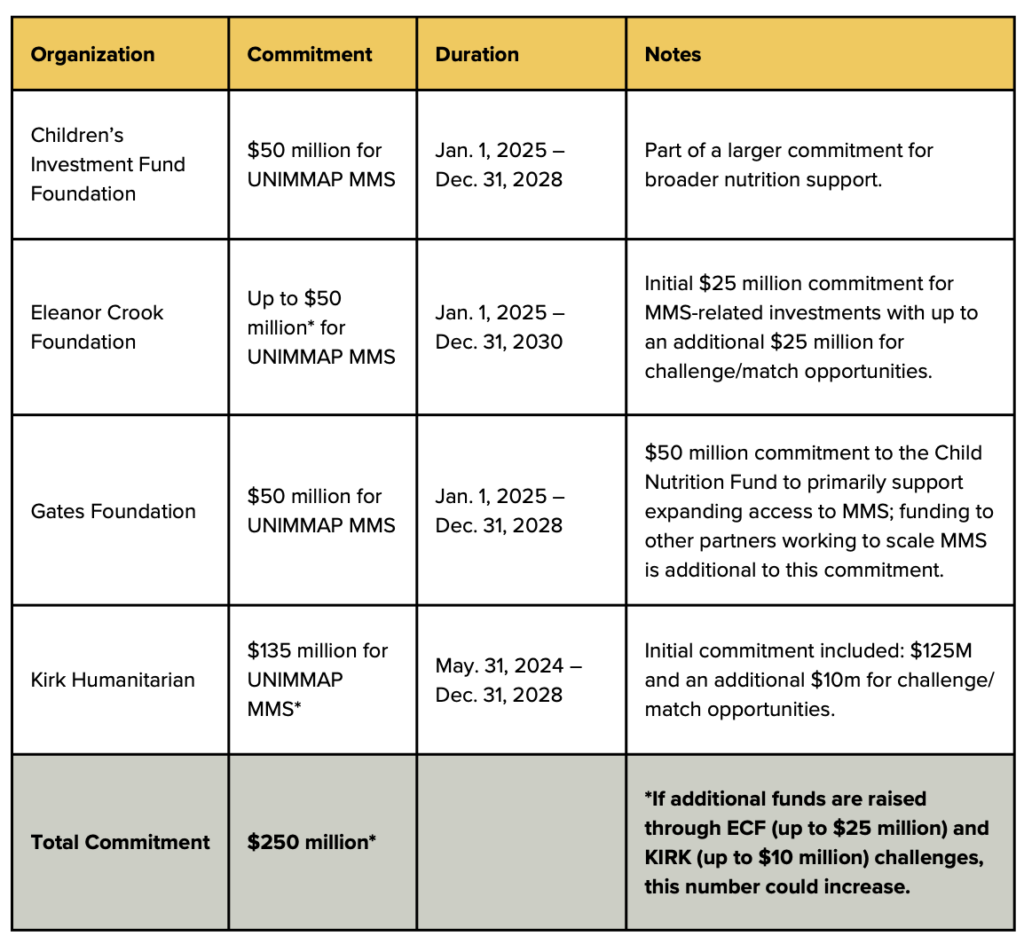MMS Joint Challenge Commitment Statement
During the Nutrition for Growth Summit, CIFF signed the MMS Joint Challenge Commitment Statement, alongside philanthropies, Eleanor Crook Foundation, Kirk Humanitarian and the Gates Foundation. This commitment is to ensure Multiple Micronutrient Supplements (MMS) - or prenatal multivitamins - can be scaled to improve maternal and child nutrition in countries with a high burden of malnutrition.
We, the undersigned philanthropic organizations, are committed to scaling prenatal multivitamins – known as Multiple Micronutrient Supplements – to improve maternal and child nutrition in countries with a high burden of malnutrition. Today in Paris at the Nutrition For Growth Summit, we are announcing a joint challenge commitment to mobilize $1 billion by the UN General Assembly in September 2025.
In May 2024, we published a global investment roadmap to provide 260 million pregnant women with MMS by 2030. At a cost of $1 billion, we could reach 260 million women and:
- Save 600,000 lives by 2030.
- Prevent 5.3 million vulnerable births, including stillbirths and low birth weight.
- Reduce 15 million cases of maternal anemia, giving mothers the strength to safely carry pregnancies.
Together, we are pledging $250 million towards that challenge and calling on governments and other public and private donors to join us to raise $1 billion for the scale-up of MMS, catalyzing transformative action for mothers and children around the world. (Specific commitment information for each organization can be found at the end of this document.)
Over one billion women and girls suffer from malnutrition, which hinders their potential and jeopardizes future generations. Adolescent girls and women in low- and middle-income countries face the greatest burdens of this crisis – and malnutrition during pregnancy threatens their lives. Babies born to malnourished women are more likely to be underweight, premature, and tragically, may even be stillborn or die in early life. Nearly 3 million children die each year due to malnutrition.
This is a crisis with a startlingly simple and cost-effective solution that is ready to be scaled now. It’s a solution found in medicine cabinets in high-income countries, but one that women in low- and middle-income countries often don’t have access to – prenatal multivitamins. Known in global health as MMS (Multiple Micronutrient Supplements), these prenatal multivitamins combine 15 essential vitamins and minerals into one tablet that helps to ensure babies are born healthy, on time, and at the right weight.
Today, in most low- and middle-income countries – where the prevalence of malnutrition and risk of child mortality is high – pregnant women take a supplement with just two ingredients, iron and folic acid, if they take anything at all. This is a double standard that must be corrected, as more than twenty years of research shows that MMS generates significantly better health outcomes for both mother and child compared to IFA [1].
MMS has been repeatedly recognized by renowned publications such as the Lancet and the Copenhagen Consensus as one of the very most cost-effective opportunities in global health and development [2]. Ensuring pregnant women take MMS is among the lowest cost ways to improve birth outcomes and save lives. In some settings like Bangladesh, switching out IFA tablets for MMS tablets at current coverage levels could prevent deaths for as little as $183 per life saved. At just $0.02 per pill, finally scaling up these prenatal vitamins could spark the next era of the child survival revolution by improving pregnancies and saving lives.
Moreover, when taken daily during pregnancy, iron containing supplements such as MMS can prevent almost half of anemia – which can be transformative for women, as anemia saps energy and increases infection risk. Anemia is also the leading cause of maternal death.
We, the undersigned philanthropic organizations, are committed to scaling MMS – as part of a comprehensive antenatal care package – to improve maternal and child nutrition in countries with a high burden of malnutrition. We are actively working not only with each other but also with governments across the world, NGOs, private sector and UN agencies to introduce MMS to the women who need it most.
Despite all we know about how important good nutrition is during pregnancy for both a mother and her baby, maternal nutrition and MMS have been overlooked and underfunded. We cannot wait any longer. To scale up MMS sustainably, it is essential that governments and donors join philanthropies. This is a unique opportunity to take on a global leadership role in tackling malnutrition and to leverage and reinforce existing mechanisms such as the Child Nutrition Fund through which new MMS funding could be deployed and leveraged, including through its match- funding element.
We hope you join us in ensuring that all mothers have the healthiest possible pregnancy and that all babies have the healthiest possible start in life with MMS.

[1] Smith ER, Shankar AH, Wu LSF, et al. Modifiers of the effect of maternal multiple micronutrient supplementation on stillbirth, birth outcomes, and infant mortality: a meta-analysis of individual patient data from 17 randomized trials in low-income and middle-income countries. The Lancet Global Health. 2017;5(11):e1090-e1100. doi:10.1016/S2214-109X(17)30371-6
[2] Investing in nutrition – a global best investment case, Copenhagen Consensus Center, February 2023